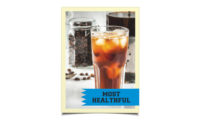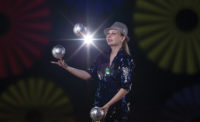Nondairy beverages mainly painted on smiles this year. Ready-to-drink (RTD) coffee was the master of ceremonies at retail, shining in both the shelf-stable cappuccino/iced coffee and refrigerated coffee segments. Juice and RTD tea, meanwhile, wore the big shoes of lower sugar and premium offerings, with mainly positive results.
Milk | Cheese | Cultured | Ice Cream | Butter | Non-dairy Beverages | Ingredients | Exports
RTD coffee not clowning around
Data show that single-serve RTD coffee is driving a lot of the growth within the overall RTD tea and coffee and RTD refrigerated tea and coffee categories.
Refrigerated RTD coffee amassed $536.6 million in sales in total U.S. multi-outlets and convenience stores during the 52 weeks ending Sept. 6, 2020, according to data from Chicago-based market research firm IRI. This is a 28% increase compared to the previous year. The shelf-stable cappuccino/iced coffee segment also registered growth, but on a smaller scale. The segment posted 5.5% growth in dollar sales, totaling $3016.9 million.
Jill Failla, foodservice analyst with global market research firm Mintel, noted in Beverage Industry’s September 2019 issue that RTD coffees have experienced growth due to their high level of innovation and convenience.
“The innovation I'm currently seeing in RTD rivals even that of some of the top coffee cafes,” she says. “For example, there's been a quick rise in the number of RTDs offering functional ingredients and benefit claims, from adaptogens to nootropics. Young consumers and Hispanic consumers are core consumers of RTD coffee, which bodes well for the continued future growth of this format.”
IRI reports that among the top 10 brands of refrigerated RTD coffees, Dunkin Donuts and Starbucks experienced the most growth. Dunkin Donuts had massive growth: Dollar sales jumped 509.0%, and unit sales soared 505.2%. Meanwhile, Starbucks saw a 46.1% increase in dollar sales and a 44.7% rise in unit sales.
As consumers redefine health and wellness, nondairy innovations continue to proliferate the RTD coffee market.
“Nondairy milk alternatives are a large part of the RTD [coffee] market's innovation. Consumers are seeking them out for health and taste reasons alike, and unsurprisingly, interest is driven by Gen Zers and millennials,” Failla said. “More major brands are launching nondairy “milk” RTD [coffee] line extensions, and new up-and-coming brands are offering them right out of the gate.”
Silk, a Broomfield, Colo.-based brand of Danone North America, jumped in on the nondairy RTD coffee trend with its RTD dairy-free lattes. According to the brand, the lattes blend the smoothness of “almondmilk” with creamy “oatmilk.” The offerings come in Espresso Almond & Oat latte and Mocha Almond & Oat latte flavors.
Cold-brewed and nitro-brewed RTD coffees remain popular in new product launches. New York-based Illycaffè, for example, introduced Illy cold brew: a ready-to-drink canned cold-brew coffee made with Illy’s iconic blend of 100% Arabica beans, perfected over 85 years. According to Illycaffè, the coffee is smooth, balanced and naturally sweet with minimal acidity. The product is available nationally; it has a suggested retail price of $3.49 per 8.45-ounce can.
As noted by analysts, among the appeal of cold-brewed and nitro-brewed RTD coffees has been their ability to support sugar-reduction trends.
“I'm seeing more brands reformulate RTDs with lower sugar content and natural alternative sweeteners such as date syrup,” Failla explains. “I'm also interested in the emergence of flash-brewed coffee, which has the potential to surpass cold brew as the cold coffee darling. The brewing method for flash-brewed coffee preserves some of the more delicate coffee notes for easy drinking and is said to require little to no sugar or creamer.”
Regarding functional RTD coffees, Chicago-based Euromonitor International highlights the mixed performance the segment has seen in the past few years. Yet the market research firms also foresees further potential in terms of fortification.
“Beneath the two giants, Starbucks and Monster, smaller brands are moving aggressively into this space,” states Euromonitor in its March 2019 “RTD Coffee in the US” report. “Exploration is taking place in functionality beyond energy, including MCT oil, probiotics and CBD oil in products, offering a much wider range of functional benefits than were previously available.”
Tea performs premium stunts
RTD tea also has been experiencing growth — albeit to a lesser degree than its coffee cousin — thanks to its growing variety of flavors, strengths and varietals. The $6.1 billion category saw a compound annual growth rate of 2.2% from 2013 to 2018, notes Los Angeles-based IBISWorld’s December 2018 report titled “RTD Tea Production in the US.”
Refrigerated RTD teas generated dollar sales of $1,772.9 million in U.S. multi-outlets and convenience stores for the 52 weeks ending Sept. 6, 2020 — a 7.7% increase over the prior-year period, notes IRI. Milos experienced the most growth among the top 10 refrigerated tea brands during that timeframe. Its dollar sales rose 21.6%, and its unit sales increased 16.2%.
While shelf-stable canned and bottled teas make up the larger of the two RTD tea subcategories, amassing $4,016.0 million in sales, the subsegment saw unit sales fall 4.2%, the IRI data show.
Several of the big tea companies recently released new RTD tea products to quench consumers’ thirst. In January, Simply Tea, a brand of The Coca-Cola Co., Atlanta, debuted in three flavors: Simply Tea with Lemon, Simply Tea with Raspberry and Simply Tea with Peach. In March, the company’s Peace Tea lineup added Hello Mango and Razzleberry Zer-OH to its iced tea portfolio in both 16-ounce and 23-ounce cans.
Similarly, the Pepsi Lipton Tea partnership, a joint venture between Englewood Cliffs. N.J.-based Unilever and Chicago-based PepsiCo, released two new green tea varieties: Watermelon and White Peach. Each 16.9-ounce bottle of tea contains 100% of the recommended daily value of vitamin C has only 90 calories, the company says.
Experts noted that health and wellness, premiumization and botanical blends could give a lift to the tea category.
With the number of flavor innovations and tea styles continuing to evolve, IBISWorld prognosticates “industry revenue to grow at an annualized rate of 1% over the next five years to $6.5 billion in 2023.”
Juice mimes less sugar
Juice and juice drinks are experiencing their share of twists and turns as health-conscious consumers are turning away from traditional juices with a high sugar content and seeking out lower-sugar options.
Some subcategories in the $7039.8 million refrigerated juice and juice drinks category are faring better than others. The refrigerated orange juice subcategory, for example, saw a 13.4% uptick in dollar sales and a 10.8% jump in unit sales over the 52 weeks ending Sept. 6, 2020, according to data from IRI.
For the same timeframe, IRI data show that refrigerated lemonade and refrigerated fruit drinks also rebounded, with dollar sales up 15.5% and 8.4%, respectively, and unit sales increasing at the rates of 12.2% and 6.0%, respectively.
However, it was a mixed story for the $803.9 million refrigerated juice and drink smoothies segment, which saw a 0.8% increase in dollars sales but a 2.9% deceleration in unit sales. Two of the top three brands saw dollar sale declines, with Naked down 0.8% and Odwalla down 24.8%, IRI data show.
Brand owners are innovating their portfolios to satisfy consumers' desire for juices that don’t come with such a high sugar content.
“Seemingly overnight, traditional beverage brands with poor ingredient quality and high sugar have fallen out of favor. We’re living through tremendous shifts in the way people eat and drink. People want quality product ingredients at a fair price,” says Tony Olson, CEO of Chicago-based SPINS.
Boston-based Ocean Spray Cranberries Inc., an agricultural cooperative owned by more than 700 cranberry farmers, announced the addition of three new unsweetened juices to its Ocean Spray Pure fruit juice portfolio, along with redesigned packaging being distributed throughout Walmart stores across the country.
The portfolio expansion and its ethos of simple ingredients represent the cooperative's continued focus on health and wellness to align with consumer demand for healthier options, Ocean Spray says, as well as the cooperative’s commitment to reshaping the future of the food system into a health and wellness system.
Beverage manufacturers also are employing alternative sweetener solutions to innovate within the juice market.
For example, Chicago-based Tampico Beverages recently launched Tampico ZERO. It is available in two flavors — Mango Punch and Citrus Punch — and joins the Tampico family as an alternative for those looking to limit their sugar intake, the company says. The brand incorporates the artificial sweeteners sucralose, acesulfame potassium and neotame to deliver its zero-sugar content, while still maintaining a sweet juice profile.
Experts note that the children's beverage market remains vital to the health of the juice category. As such, emerging brand owners are looking to supply families with juice solutions that still keep sugar content intact.
Rethink Brands, Columbia, Md., launched Rethink Juice Splash as one such juice solution. With only 1 gram of natural sugar and no artificial sweeteners, Rethink Juice Splash is positioned to be the new benchmark of health in the kid’s aseptic juice category, the company says. Rethink Juice Splash comes in Watermelon, Fruit Punch, Kiwi Strawberry and Strawberry Lemonade varieties.
Another area offering potential for the juice market has been superpremium juices. Sales of superpremium juices rose in nine consecutive years, according to BMC's 2019 report titled “Fruit Beverages in the U.S. Through 2023: Market Essentials.”
Cold-pressed juices also are contributing to growth of the juice category. In 2019, Fort Pierce, Fla.-based Natalie’s Orchid Island Juice Co. launched a line of cold-pressed juices. The cold-pressed juices are available in three varieties: Purify, made from blood orange, grapefruit, dandelion and ginger to help reduce inflammation and improve digestion; Relax, made from orange, pineapple, chamomile and passion flower to help calm the mind and relax the soul; and Resilient, made from blood orange, elderberry, turmeric, black pepper and ginger to help boost the immune system and lower inflammation.
The Coca-Cola Co. also expanded into the superpremium juice market with its Simply Beverages’ Simply Smoothie line. The new beverage lineup offers an easy and convenient way to consume a healthy snack — nothing to chop, blend or clean up, the company says.
“People’s lives are always moving at a fast pace, and they are looking for snack and beverage options that help them maintain a well-rounded, healthy lifestyle,” says Kelly Marx, Simply Beverages brand director. “Simply [Smoothie beverages] allow everyone to enjoy the delicious taste of a smoothie no matter where they are, at any time, without the hassle and mess of blending it themselves.”
Note: This article was condensed and edited from separate 2020 articles appearing in Beverage Industry, a sister publication of Dairy Foods. The authors are Sarah Graybill and Barbara Harfman.
Milk | Cheese | Cultured | Ice Cream | Butter | Non-dairy Beverages | Ingredients | Exports







